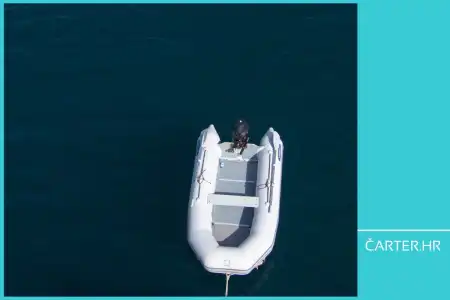
- 24.04.2023.
- News, Technology
The information you provide to your users and guests online through your website is necessary for transparency and building trust. However, some information is required by law, and you must provide it.
Let us start with the basic and logical things. You need to be transparent about your company on the website. As well as your team of employees, your workflow, your plans and mission, possibly the management and so on.
And why? Chances are that this data will be among the first things people look at.
But that's not all: you must also make legally required disclosures on your website.
In addition to introducing your staff team, you should also introduce your charter company or yourself. But not only yourself, especially if you have a larger group of employees.
We hope that while you are reading this, you are simultaneously reviewing your website, looking for errors and ways to improve it. We are sure you have everything you need, including a visually appealing website, quality content, and easy navigation.
Don't have all of this? Then find out what is needed below.
Why you should introduce your employees, your company and yourself?
Surely you have come across websites where either none of the employees is presented, or there is only brief information about the company's CEO, usually without a picture. However, in the description of this managing director, there are only titles, diplomas and some general information.
In the second most common situation, the company is talked about as a team of people, which is again described with generic text, without any basis that this team is different from any other team in the world.
Give your users content that is high quality and gives them what they want to read. Write who your employees are, what they do, and what they are like. At the same time, state your company's vision or mission, what your daily work routine looks like, etc. All these things will attract people's attention and give them a better insight into your charter.
In order to best present yourself and your company in a simple way, try to answer the following questions honestly and transparently:
- Who are you?
- What do you do?
- How do you do it?
And if you are particularly inspired or think you have more to say, write why you do what you do, include your work processes, etc.
Don't use generic words, but be honest about who you, your employees and your company are and what you do. Write how and why you want to help people.
Everyone wants to give their guests a first-class vacation - so highlight what sets you apart. It would be best to have someone professional write this copy for you. Someone who will present you in the best but also unbiased light.
One more note: Do not mix professional or stock images with non-professional images of your employees, office or business when presenting yourself online. This will devalue not only your website but your team as well. And if you do mix them, they should be compatible and of the same quality.

What information about your company and agency MUST be displayed on the website?
Croatian law has already specified what information companies' websites (including charter companies and agencies) must contain, including the privacy policy and Impressum.
The privacy policy is a document that explains how the personal data that users leave when using your website will be collected, used and processed. They are mandatory for websites that collect personal data such as email addresses, first and last names and the like. The privacy policy should state what data you collect, for what purposes, how you protect it, and how it is used.
Impressum is mandatory for all websites of business entities in Croatia. In addition to the name and address of the company, in the Impressum, you are required to state the basic registration data of the company, as well as the data of the supervisory authority, i.e. the commercial court that supervises your activity. So, as a charter company or agency, you must state:
- name and registered office of the company (full legal name and address of the registered office)
- registration in the court register (court and number under which the company is registered)
- travel agency identification code
- OIB and registration number
- the current account, IBAN and the name of the bank where the company has an account
- amount of the company's registered capital (and whether it is fully paid up)
- board members
According to the Electronic Commerce Act, you must also provide a telephone number and an email address, that is, a contact at which you can be reached at all times. If you are a corporation with shares, you must indicate the number of shares issued and their par value.
Article 630, paragraph 1, item 2 of the Companies Act states that if you, as a legal entity, don't operate the business as recorded in the court register and on the business documents. If you don't provide the required information on the company's website, you may be fined up to approx. EUR 6,600.
If you operate as a tourist agency, the Act on Provision of Services in Tourism in Article 21, states that you have to provide the following information on your website (in Croatian, but another language may also be used simultaneously):
- company and registered office
- name and the last name of the managing director
- the function in which he acts and the powers he has
- email and telephone through which direct contact is possible, as well as the working hours
- the number of the court or other public register in which the agency is registered, and information about the register
- personal identification number of the company
- VAT identification number, if you are liable to pay VAT
- information on the competent authority to which the agency's activities are subject to official supervision
- clear instructions on how to file a complaint
- general terms and conditions
The penalties for non-compliance with the resolutions of the Companies Law (Article 109, paragraph 1, item 7) state that you may be fined from 300.00 to 2000.00 EUR for an infringement if you have not published on your website information from the Article 21 of this Law.
You can easily add all the data required by law to the website's footer so that the data can be accessed with one click and without significant complications.
This information is not only required by law but also serves to provide transparency and information to the users of your website. If these details are incomplete or absent, you will face fines and other sanctions, so correct them as soon as possible.
Is it necessary to highlight the director of the charter company?
Information about the company's director is not required on the company's website unless he is a board of directors member. You can include this information on your website to get "extra points" from guests. But additional descriptions are not necessary, and it depends from company to company.
But every additional sentence you mention is useful for guests and potential partners or investors who want to know who is running the company and who is involved in the management.
However, it is vital to consider the potential security risks. If information about the CEO is available on a website, it may also be accessible to possible malicious individuals. Whether or not you choose to publish the CEO's information on your website is up to you.
What other information do you really need to show?
Transparency of data on your company's website is also critical for many additional things, such as attracting and retaining customers, building your brand, and making your business successful. In addition to everything we have stated so far about what you must and should put on the web, we can add a few more details:
Contact information - Don't forget contact information, including your charter company's phone number, email address, and location. Make the contact form a simple online form that can be filled out and submitted quickly. Clicking on a phone number should instantly open the call application in the desktop version or immediately make a call in your website's mobile version of your website.
Photos - let your photos be yours, and avoid "downloading" pictures of yachts in your listing online. Or use stock photos of interiors or exteriors that don't show your vessels. This is something that definitely does not inspire confidence.
If the vessel is new and you include it in your listing before it even arrives at your marina, that's fine. But as soon as you can, you should take photos of the vessel where it's obviously at your dock and in your yacht charter.
Services - provide detailed information about the services you offer, such as the types of boats you have, price lists, rental terms, etc. The more information you provide on your website, the easier it will be for guests to book and the fewer questions they will ask you later. Make this data easily accessible on the internet, and don't "hide" it.
Reservations - data transparency includes legal requirements, what might be of interest to users, and the reservation process as well. It should be as simple as possible, i.e. the guest should be able to select the desired yacht, reserve the period he wants to sail, make a deposit and go through all further steps with as few clicks as possible.
Why is data transparency important?
Being transparent about your data and its display is vital for building trust with your users or guests. People will feel more confident if they have access to information about your business and services. Also when they can read a lovely story about you, your team and your company. This creates a sense of authenticity as well.
How to describe that feeling of authenticity online? Try comparing it to a website with none of the above; there is no personal information, not even basic information. The first reaction is always, "That looks suspicious". Let your website be the opposite of that - trust, reliability, professionalism (and, of course, the legally required information).
It takes people less than a second to get an idea of who you are. And no, they will not return to your site if their first impression isn't good or they can't find what they were looking for.
That would also mean they have to fight their way through a lot of text. Or having to fight images and pop-ups to book a vessel. Or if the booking process is too complicated.
Or worse, if you don't even have a slot for booking - instead, the option to send a direct email opens up immediately. Chances are, your potential guests will leave the website without making a booking. They will look for another yacht charter provider where they can get what they want quickly and easily.
Data transparency is crucial because it allows for complete online business visibility without hidden intentions and ambiguities. So make an effort and provide clear and concise information on your website that your guests and yourself can easily understand.
Categories of trends
- News
- Sale
- Marketing
- SEO
- Web design
- Social media
- Technology
- Regulations
- Management
- Education
- Finances
- User experience
Newsletter
Sign up for the newsletter and receive the latest trends and tips straight to your inbox






